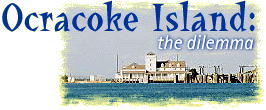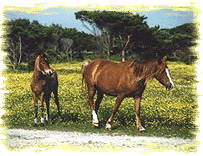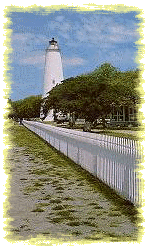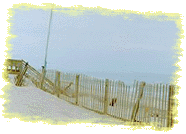 |
 |
 |
|
|||
|
Ocracoke Island: the dilemma
Four years ago, my friends and I were looking for a vacation spot in the Carolinas. Most of the beach towns, from Kitty Hawk to Nags Head to Hatteras, are accessible by highway, and they show it -- with drive-through liquor stores, outlet strip malls, and fast food complexes mingled with five story condos.
Best of all, a 40-minute ferry ride separates the island from the rest of civilization. As we pulled into the harbor on our first trip, all we saw was miles of sand and beach. Our home was a tent on the beach, and we felt the island was ours. We only occasionally ambled into the village for a bit of air conditioning in the town's only pub. It's there we saw early signs of development. It was only this year, our third visit, that we realized we weren't the last ones to discover this island paradise -- the house we rented over the Internet was sandwiched between construction sites, which will soon turn into more rental homes. Making our way from the ferry dock to Ocracoke village, population 800, the effects of one and a half million visitors a year had begun to take its toll. There are ice cream stores and gift shops at every corner. Tourists ride rented bikes down the middle of the street in herds, forcing locals in pick ups off the road. Ferries arrive every 10 minutes or so, and wind-burnt old men hawk sailboat cruises or fishing expeditions.
Eighty-three-year-old retired fisherman, Owen Gaskill, shades himself all day next to a fruit stand on his front lawn, where tourists drive by on their way to the village lighthouse.
The days are gone when Owen knew everyone at the post office and general store. But he says the islanders have accepted change, grudgingly but sometimes thankfully.
Owen's only spent ten years away from the island. But many younger folks came from other places to share the tranquility of Ocracoke, and they helped build a tourist industry that they now partially regret.
Tony Sylvester, a deeply tanned 48-year-old, moved to Ocracoke more than twenty years ago -- to escape the chaos of the Jersey shore. He began as a carpenter and builder, and a few years ago, he started a surf shop and kayaking business.
I guess he was talking about shops like this, the Island Ragpicker, where I bought a t-shirt, a few postcards, a shell necklace, and a cutting board. None of which I really needed. But isn't my money welcomed into the local economy? Yes and no, says born and bred Ocracoker, Candy Gaskill.
Four generations of Candy's family have run the wood-thatched Albert Styron general store. They used to sell grocery staples. Now they stock gourmet cheeses and wines.
It would be easy to fool myself into thinking I'm not really the problem. If I were the last to discover the island, then everything would be fine. I tell myself it's the thousands who came later, demanding cable TV, playing loud music, willing to pay four dollars for an ice cream cone, who corrupt a charming island village. Of course, deep in my heart, I know my mere presence on someone else's homeland changes it, and yet I can't bear to give it up. At least not until it becomes just like everywhere else. By the way, Tony Sylvester - the surf shop owner? He's retiring this year and moving to a seaside village in Central America. He won't tell a soul where it is. Candy Gaskill would like to stay put, but isn't sure she can afford the rising property taxes. But Owen Gaskill, the old fisherman turned fruit seller, plans to die on the island.
|
 | American Public Media Home | Search | How to Listen ©2004 American Public Media | Terms of Use | Privacy Policy |

 I went to the local library to find a more remote place. What I
discovered was Ocracoke island. It's described as 10 miles of federal
park land and rich natural life, with forest trails and beach dunes.
And its romantic character appealed to me as much as the natural
beauty. The pirate Blackbeard was captured on Ocracoke in the 1600s,
wild horses used to roam there, and the native islanders had even
developed a distinct dialect.
I went to the local library to find a more remote place. What I
discovered was Ocracoke island. It's described as 10 miles of federal
park land and rich natural life, with forest trails and beach dunes.
And its romantic character appealed to me as much as the natural
beauty. The pirate Blackbeard was captured on Ocracoke in the 1600s,
wild horses used to roam there, and the native islanders had even
developed a distinct dialect.
 Which is not to say I minded all this. I was on vacation and in the
mood for a little indulgence. But at the same time, I felt protective
of the island -- and had an urge to record the charm of Ocracoke,
before it becomes another Hatteras.
Which is not to say I minded all this. I was on vacation and in the
mood for a little indulgence. But at the same time, I felt protective
of the island -- and had an urge to record the charm of Ocracoke,
before it becomes another Hatteras.
 New Hampshire native Ron Cook was reading the newspaper at the
Ocracoke coffee house, which looks more like a Seattle coffee joint
than a spot you'd find in a fishing village.
New Hampshire native Ron Cook was reading the newspaper at the
Ocracoke coffee house, which looks more like a Seattle coffee joint
than a spot you'd find in a fishing village.